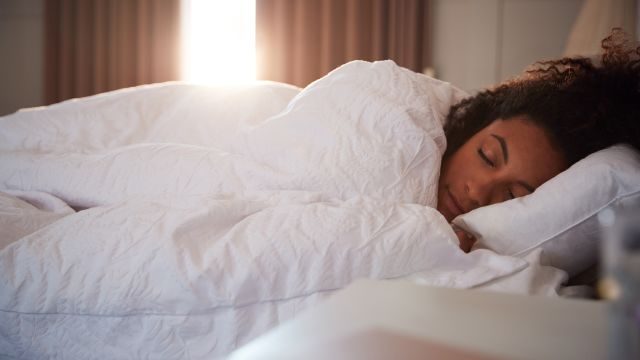It may not seem like a big deal, but if you’re not getting enough sleep, you may be hurting your health. When you miss out on sleep, you’re not just going to feel groggy during your early-morning meeting, you may be increasing your risk of high blood pressure, heart disease, diabetes, obesity and in turn, your risk of mortality.
Everyone has different needs, but the National Sleep Foundation recommends most adults get seven to nine hours of sleep per night. Here’s the real deal on sleep, and how a healthy amount of it can work wonders.
7 health benefits of adequate sleep
While you may not be able to snooze for the recommended amount of hours every day, practicing good sleeping habits a majority of the time can provide a slew of health benefits. Here’s a look at some of them:
Your skin is going to love you
Collagen—a protein that helps give your skin structure, promotes new skin cell growth and assists in getting rid of old cells—is produced during sleep. Collagen also helps prevent wrinkles and boosts the elasticity of your skin.
Proper sleep may also help reduce inflammation and swelling. After a restless night, your body may feel swollen because it’s holding excess fluid, and because it’s produced more cortisol, the stress hormone. A good night’s sleep allows your body to get rid of all the excess fluid and repair the skin.
You’ll be in a better mood
When you’re rested, you’re decreasing your risk of depression. Alternatively, if you’re not getting enough sleep, your more likely to feel sad, angry and stressed out. If you skimp on sleep, you may even overreact to certain events throughout the day because you’re less patient and more short-tempered.
When it comes to anxiety, one study shows that when you’re sleep deprived, you may be increasing your risk for “anticipatory anxiety,” a type of anxiety you may feel prior to a big trip or presentation.
You’ll have less trouble remembering things
If you’re getting enough sleep, you may be strengthening your memory. A good night’s rest will help your brain make sense of memories. Proper sleep also allows all of the information your brain is storing to shift from one area of the brain to the other more easily, a process necessary for consolidating memories. Adequate sleep may also help you learn, concentrate, be creative and make decisions.
You’ll have a healthier heart
While you’re sleeping, your body is able to repair the heart and blood vessels, an important part of keeping your heart healthy. Proper sleep also helps reduce your risk of heart attack, high blood pressure and stroke.
You’re managing your sugar levels
When you get enough sleep, your body responds better to insulin, the hormone that controls your blood glucose (sugar) level. When you’re not as rested, your body is probably going to have a higher blood sugar level, which increases your risk of diabetes.
You’re likely to shed pounds
When you’re in deep sleep, or slow wave sleep, your body is burning calories.
If you don’t get enough sleep, your body’s hormones may get out of whack. When you skimp on sleep, your body produces less leptin—the hormone that helps you know when you’re full—and more ghrelin, the hunger hormone that ramps up your appetite.
You’re less likely to get sick
Sleep can boost your immune system so your body can fight off infections and diseases. If you’re not getting enough sleep, your immune system may not be able to respond to germs like it should.
Want to get better sleep and slow the aging process? These tips can help.
- Stick to a schedule. Pick a bedtime and wakeup time, and stick to them.
- Keep your room dark and cool. Skip that last Facebook check before bed and aim to keep your room’s temperature between 60 and 70 degrees.
- Limit alcohol, caffeine and tobacco before bed.
- Wind down before bed. Try taking a relaxing bath or indulging in some aromatherapy.
- Skip the daily nap. If you do have to nap, stick to 45 minutes or less, and avoid them completely after 3 p.m.
Start your journey to longevity by taking Sharecare’s RealAge Test. It measures your biological age based on your genetics, health and health habits. You can also download the Sharecare app (for iOS and Android) to see how your sleeping habits stack up, and find more tips to get a good night’s rest.






